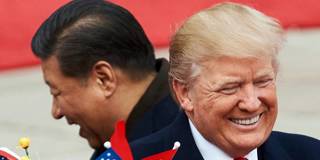The US government should focus on combating foreign governments’ trade policies – such as technology theft, non-tariff barriers to US exports, and forced technology transfers – that hurt American firms without any offsetting benefits to American consumers.
CAMBRIDGE – The National Security Strategy released by the White House earlier this month differs from the previous congressionally mandated strategies that have been prepared every four years. The 2017 NSS is different because it emphasizes the role of the economy: “Economic security is national security,” the new NSS avers.
Much of the report is of course devoted to traditional aspects of national security: military budgets, alliances, and dealing with countries like Russia and China, which the new NSS calls “strategic competitors” (rather than adversaries). But the growth of the domestic economy, the role of international trade, and America’s new positive energy position also receive substantial attention.
President Donald Trump’s administration rightly points to its regulatory reforms and its recently enacted tax legislation as strategies for increasing economic growth. A bigger economy provides the resources to build stronger military capabilities. But that economic growth can translate into more effective national defense only if Congress enacts future increases in the defense budget, targeting those areas that are in greatest need of expansion.

CAMBRIDGE – The National Security Strategy released by the White House earlier this month differs from the previous congressionally mandated strategies that have been prepared every four years. The 2017 NSS is different because it emphasizes the role of the economy: “Economic security is national security,” the new NSS avers.
Much of the report is of course devoted to traditional aspects of national security: military budgets, alliances, and dealing with countries like Russia and China, which the new NSS calls “strategic competitors” (rather than adversaries). But the growth of the domestic economy, the role of international trade, and America’s new positive energy position also receive substantial attention.
President Donald Trump’s administration rightly points to its regulatory reforms and its recently enacted tax legislation as strategies for increasing economic growth. A bigger economy provides the resources to build stronger military capabilities. But that economic growth can translate into more effective national defense only if Congress enacts future increases in the defense budget, targeting those areas that are in greatest need of expansion.